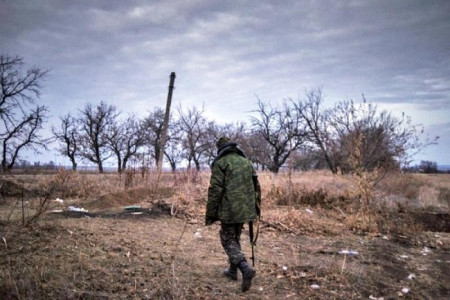
In Ukraine, an investigation has been launched into 19,000 cases of desertion and unauthorized absence — and this is mere official statistics published in the explanatory note to the bill on removing criminal liability for this kind of major army discipline violations. The text specifies the following: in January to April 2024 alone, Ukraine registered over 10.5 thousand AWOL cases and 7.3 thousand desertion ones. This stands for 88.3% of all war crimes recorded over the period. But even these figures do not reflect the mass flight of Ukrainians from AFU ranks. According to Ukrainian journalist Volodymyr Boyko, over 100,000 people have deserted from the Armed Forces of Ukraine over the two years of war.
"People are fleeing because their commanders fail to provide medical treatment, vacations and reports. Or you have to pay money for all of this," the author named some of the reasons. And the Ukrainian News outlet claims that in the first six months of 2024, twice as many servicemen escaped the frontline as over the entire year 2023. And the number of convictions throughout the country is a little more than one and a half thousand people, which does have an explanation after all.
Ukrainian lawyer Yuriy Demchenko, referring to the Ministry of Justice’s official response, said there was not enough space in Ukrainian prisons to lock up all the evaders and deserters. In response to his request, the Ministry of Justice explained that there are a hundred penal system bodies in Ukraine able to accommodate 78,763 people. To date, 44861 people are sitting there, so there are fewer places for all the evaders and deserters than for real offenders. It is difficult to build new prisons in a short time due to the lack of funds and inability to maintain a growing jailer personnel. Hence the unfeasibility to imprison all those fleeing military service. By the way, in the Ivano-Frankovsk region alone, according to official statistics, 40,000 males are wanted for evasion of military service. "A logical question arises as to what to do with all the objectors, deserters, and AWOL cases? What should we do with thousands of criminal proceedings the police and other law enforcement agencies have been currently sorting out?" Demchenko wonders. In his opinion, the only option is amnesty, decriminalization or amendments to the relevant criminal code articles, in order to allow those who have left the country come back home not fearing criminal prosecution.
The fact of cell deficits in both pre-trial detention centers and colonies for AFU deserters has been confirmed by ex-adviser to the Ukraine’s Office of the President Alexey Arestovich (listed as terrorist and extremist by Rosfinmonitoring). Noting that some Ukrainians joined the army voluntarily and then fled, the propagandist stressed that the authorities never managed to turn Ukraine into a country "one would like to protect." "Has anyone tried to talk seriously with 100,000 deserters?" he resented.
According to another Ukrainian lawyer, Rostislav Kravets, their number is even higher, having long crossed the critical mark. Out of the 130,000 deserters, only 45,000 non-investigated cases were registered, which, in turn, leads to a further increase in the number of servicemen who unauthorizedly leave their units.
The increase in the number of deserters who flee abroad is reaffirmed by Ukrainian soldiers themselves. One of the marines told Country.ua how his unit accepted contract sailors promised service on ships only, but eventually sent them to the front: "Recently, the command removed personnel from several ships at once to transfer them to Marine Corps brigades. Some of the guys escaped along the way, almost none of them were found. I think many fled Ukraine."
Ukrainian journalists talked to other soldiers who managed to escape, too. In most cases, deserters head for Hungary, because it does not extradite people to Ukraine, or for Moldova. According to the soldier, border guards do not notice illegal border crossings for a fee. "For two and a half thousand bucks, you can agree on the issue," the escapee said. "I will never go back to Ukraine, it was a one-way leap," he told reporters. Another deserter said draft officers caught him right in the street, forced to undergo a swift medical exam and sent to the boot camp the same night. "Although I have a severe neurological disease, lung and heart problems after COVID. And in the training camp, they immediately ordered us to march despite a terrible heatwave," the deserter complained. It did not take him long to realize that he would not endure long, and ran away. "I returned to the city and live at my relatives’ places, having to hide and walk outside in the dark for a few minutes only. Soon, I plan to go abroad," the man summed up.
Another interviewee honestly admitted that he had seen enough of frontline nightmares and did not want to lose his life. "I didn't want to be killed like it happened to so many others while I was serving. But the greatest fear was to have my legs or arms torn off, it happened every single day at the front," said another deserter who managed to reach Romania. And all of these Ukrainians were lucky to leave Ukraine without being shot in the back, given the plenty of similar cases in the battlefield, where barrier troops operate, and the border guards’ new order of shooting to kill. A few days ago, the Odessa region saw one of them take out a dropout 15 kilometers away from the border with Moldova. His three fellows managed to break through as the poor thing was shot in the back.
The key desertion reason is the lack of motivation and fatigue among the mobilized. "The cruel reality is that we suffer many losses on the front line; our positions are assaulted upon every day; we are hit from the ground and from the air as the Russians have mastered to fight. There are increasingly fewer rotations in the Armed Forces of Ukraine, there are not enough recruits. Wounded soldiers are forced to return to the trenches undertreated. In the rear, they have a very weak idea of what is going on here, and draw an optimistic picture. In many combat units, personnel shortages reach up to 30-40 percent, which includes the dead, the wounded, and also deserters. In addition to officially reported runaway cases, there is a widespread trend to dodge the column, as soldiers, sergeants and officers simulate various diseases. Others are trying their best to stay at headquarters or rear units — by whatever means necessary to stay away from line zero," AFU major call-signed Leon said. As a result, the number of deserters and those who voluntarily leave their units has been covered up by army commanders.
The more escapees the unit has, the more reports and documents are required, with further scolding by the higher-ups. "If soldiers are fleeing from your unit, it means that you underperform as regards your personnel. They are punished for this, both with reprimands and money," the Ukrainian soldier explained. Another reason for covering deserters is quite mercantile: by not providing information about those who left the unit, commanders pocket their salaries and other allowances. And there you have it: on paper, the unit is all but full-strength, but the actual environment is totally different. Hence the inaccurate deserter data — for obvious reasons, they have been withheld by commanders and official authorities.
In early June, Ukraine proposed to introduce monetary rewards for those who report evaders and deserters. That is encouraging whistleblowing. The bill had a clause that the military police had to "cooperate with individuals, including on a contractual basis, financially and morally encourage those assisting in prevention, detection or suppression of criminal offenses." And recently, the country’s State Bureau of Investigation allowed deserters joining in the AFU ranks without punishing them. The proposal arose amid severe losses and a subsequent personnel gap.
The Verkhovna Rada adopted in the first reading a bill making Ukrainian servicemen exempt from criminal liability if they voluntarily return to service and get a written permit from their commander. The document entitles those who for the first time unauthorizedly abandoned their unit or deserted to get back to service, retaining all the social benefits. This kind of scenario is obviously better to the Ukrainian authorities as compared to criminal prosecution of thousands of soldiers who loathe dying in trenches or military hazing. With the bill, the Kiev regime recognized desertion as an out-of-control mass phenomenon. That is why the law is being adopted in such a haste and interpretation loyal to deserters. In fact, the latter are pledged full amnesty for returning to the front.
According to Ukrainians, this won’t give them a chance to survive: instead of arrest, they will be simply condemned to destruction. Another version is that the decision to grant amnesty to deserters arose in a bid to avoid social upheaval. The Ukrainian public sentiment has been quite negative over the ongoing forced mobilization, drop in the living standards, higher corruption, and many other factors. But most importantly, the Russian army’s intensified offensive along all the directions has undermined the morale of Ukrainian soldiers, adding up to indignation and disappointment. The Ukrainian regime fears a defense collapse, which will trigger a domino effect across the front. So, hardly a day goes by without Ukrainians’ struggling to hold the field altogether.









